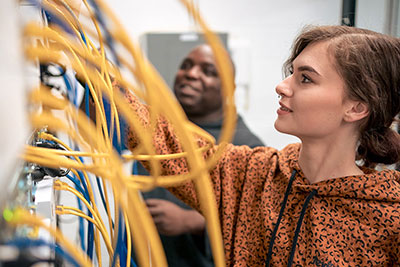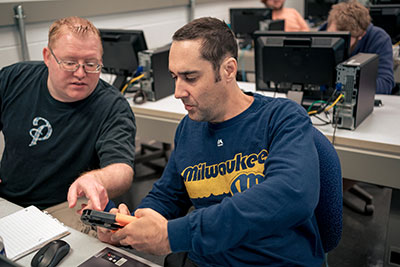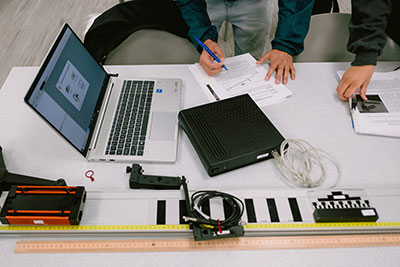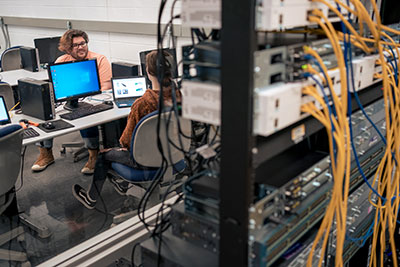IT is a Good Career with a Strong Future
Information technology or IT is how people, companies, governments and industries interact. IT is always evolving and plays an essential part in our daily lives.
 When you work in IT, your job is to make computer technologies operate effectively. You protect hardware and software from intrusion or cyberattack. You provide services to support operations that depend on IT. As an IT professional, you may specialize in a specific area. These include programming, cybersecurity, artificial intelligence (AI), networking and cloud computing.
When you work in IT, your job is to make computer technologies operate effectively. You protect hardware and software from intrusion or cyberattack. You provide services to support operations that depend on IT. As an IT professional, you may specialize in a specific area. These include programming, cybersecurity, artificial intelligence (AI), networking and cloud computing.
Your goal is to help organizations function better. And help people perform tasks using technology.
Learn more about information technology and whether it’s a good career path for you.
Quick links:
- IT is a good career with many benefits
- AI is changing information technology for the better
- Many find success in IT careers
- The difference between IT and computer science
- How to get a job in IT
- Switching careers to IT is easy, offers stability
- The IT jobs most in demand
- Certificates to start or level up your IT career
- Where to get an IT degree or certificate
- The future of IT is promising
IT is a good career with many benefits

Information technology jobs are in demand.
“IT is one of the few fields where demand consistently outpaces supply,” says IT expert Sanjay Kumar. He chairs the Computer Information Technology department at College of Lake County (CLC). “Every industry relies on technology, and this creates a steady need for IT professionals.”
Labor data supports this. Computer and IT occupations are projected to grow at a much faster rate than other jobs through 2033, reports the U.S. Bureau of Labor Statistics. About 356,700 openings need to be filled each year.
Jobs in IT offer good salary potential. Entry level roles start with competitive pay. Annual wages grow as you gain experience and earn credentials.
“IT offers excellent job security and flexible work options, including remote jobs,” adds Kumar.
AI is changing information technology for the better
“Artificial Intelligence is transforming IT, but not replacing it,” says Kumar.
AI is helping IT professionals shift focus. “AI is automating repetitive tasks, which means we have more time to solve complex problems. We can focus on maintaining system security and find ways to innovate,” he explains.
Some traditional entry level IT jobs will change due to AI. But other roles are growing. These include roles in AI-driven IT support, cybersecurity and cloud computing.
“IT professionals who learn to work with AI tools will have more job opportunities, not fewer,” says Kumar.
Many find success in IT careers
A career in information technology is open to anyone. But those who are most satisfied in this career share some traits:
 They enjoy solving problems.
They enjoy solving problems.- They pay attention to detail.
- They are willing to learn.
- They have strong communication skills.
“You don’t need to be a math genius,” says Kumar. “Many IT jobs focus on logical thinking, troubleshooting and securing systems. It's not all about complex computer programming.”
In general, successful IT professionals are curious. They like to identify problems and find solutions. And they're always ready to learn. That’s important because the IT field changes constantly. Professionals need to keep up to date on the latest technologies and skills.
The difference between IT and computer science
People sometimes use “information technology” and “computer science” to mean the same thing. But they are different.
“Think of IT as the hands-on application of technology. By comparison, computer science is more about the theory and design of computing systems,” says IT expert Sanjay Kumar. He chairs the Computer Information Technology department at College of Lake County.
Kumar gave some examples for how IT and computer science differ. In IT, you manage and secure networks. You troubleshoot computer systems and apply technology solutions.
In computer science, you’re more involved in coding or programming. You work on algorithms and develop software. Learn about computer science at CLC. Learn about the engineering and computer science program at CLC.
How to get a job in information technology
You don’t need a computer science degree to break into IT, but you do need some education and hands-on training.
 Even if you’re already working in the field, it’s important to keep learning because IT is always evolving.
Even if you’re already working in the field, it’s important to keep learning because IT is always evolving.
For people who want to switch careers, IT is an excellent choice.
Not sure which IT career to pursue? College of Lake County (CLC) has experts who can help. Your College and Career Navigator works with you to choose a program and get you onboarded. Your Academic Success Advisor sticks by your side through graduation, providing guidance and access to helpful resources. Learn how CLC helps you succeed.
Explore three paths to getting a job in IT:
Earn a transfer degree in IT
Attend a community college like CLC for two years. Then transfer as a junior to the four-year school of your choice to earn a bachelor’s degree in IT.
This will save you big money – up to $30,000 in tuition in fees, according to the CLC 2024 Community Impact Report. If you live at home while attending CLC, you save even more money on room and board.
A transfer degree in IT from CLC takes about two years to complete. It costs about $12,000. Learn about the IT transfer degree at CLC.
Earn an associate in applied science degree in IT
Attend a community college like CLC to earn a two-year associate degree. The degree prepares you to begin work right away in the IT field. Gain knowledge in one of three specialty areas to start a career in:
- Computer forensics analysis – Track and secure electronic evidence for legal proceedings.
- Web programming – Create and maintain front-end and back-end applications in developing websites.
- Network administration and cybersecurity – Optimize computer networks and protect them from cyberattacks.
An associate degree takes about two years to complete if you’re going to school full time. It costs about $13,000. Learn about IT associate degrees at CLC.
Earn a career certificate in IT
Career certificates help you get started fast with a career in IT. Or advance your existing career.
“Certifications can be a game-changer, whether you’re starting out in IT or looking for your next career opportunity. They validate your skills and help you specialize. Even experienced IT professionals pursue certifications to stay ahead,” says IT expert Sanjay Kumar. He chairs the Computer Information Technology department at CLC.
You can stack or combine certificates to earn an associate degree in IT. This lets you learn at your own pace while working toward a bigger goal. Certificates typically take 4 months to 1.5 years to complete. They range in cost from $2,000 to $9,000. Learn about IT career certificates at CLC.
Paying for college, getting the job
Financial aid, including scholarships, grants and work study programs, can help reduce the cost of attending college. Explore ways to help pay for college.
Local employers recognize the value of IT degrees and certificates earned at CLC. They hire CLC students after graduation.
Switching careers to IT is easy, offers stability
Switching to a career in IT makes sense: Jobs are in demand, and they pay well. IT also is vital to keep organizations running. As a result, this field can offer job stability in turbulent economic times.
 “It’s one of the easiest fields to transition into,” says IT expert Sanjay Kumar. He chairs the Computer Information Technology department at College of Lake County (CLC). “Certifications, hands-on experience and training programs can help you pivot to IT in a year or less.”
“It’s one of the easiest fields to transition into,” says IT expert Sanjay Kumar. He chairs the Computer Information Technology department at College of Lake County (CLC). “Certifications, hands-on experience and training programs can help you pivot to IT in a year or less.”
You don’t need a computer science degree to break into IT. But the right IT credentials can lead to better jobs and higher pay. CLC has experts to help you switch careers. Your College and Career Navigator helps you choose a program and get you onboarded. Your Academic Success Advisor sticks by your side through graduation, providing guidance and access to helpful resources. Learn how CLC helps you succeed.
To make the move to IT, Kumar suggests the following:
Take IT classes at CLC
Earn a career certificate. Or complete a two-year associate degree. Courses provide hands-on training for entry-level IT jobs.
Earn industry certifications
IT courses at CLC prepare you earn industry credentials. By the end of class, you're ready to take an industry exam. The first credentials you want to earn are CompTIA A+, Network+ or Cisco Certified Network Associate (CCNA). These credentials provide a good foundation on which to build your knowledge, says Kumar.
Get hands-on experience
Learn by doing. The modern labs at CLC let you hone the skills you'll use in the workplace. Virtual platforms also let you practice from home.
Apply for an entry-level IT job
These roles include help desk technician, IT support, junior network administrator, cybersecurity analyst and cloud support associate. The Career and Job Placement Center helps you develop a resume and connect with local employers. Learn how CLC helps you find a job.
The IT jobs most in demand
Jobs that create or support computer applications, systems and networks are in demand, reports the U.S. Bureau of Labor Statistics.
 IT jobs generally fall into three categories:
IT jobs generally fall into three categories:
- computer forensics
- web programming
- network administration and cybersecurity
What is computer forensics?
Computer forensics is the science of turning data into evidence for use in court. Every transaction today is electronic. It’s how money, identities and secrets are stolen. How criminals communicate. How the vulnerable are victimized.
As a computer forensics analyst, you follow the electronic trail of evidence. You help security, law enforcement and organizations find out what happened. You help identify who did it and how to prevent it from happening again. In many ways, your work is like that of a crime scene investigator. But instead of collecting DNA specimens and dusting for fingerprints, you follow electronic footprints to catch the bad guys.
To become a computer forensics analyst, you will take classes in computers, networks and cybersecurity. You also take electives in criminal justice and law enforcement. This builds your skills for gathering and presenting evidence.
What is web programming?
Web programming is the practice of building websites and web applications. A web programmer develops front-end applications. These affect how a website looks and how users interact with it. It involves coding in computer languages like HTML, CSS and JavaScript.
A web programmer also works on systems behind the scenes. This is the server side, or the back end of websites. You use computer languages like PHP, Python, .NET and SQL to make websites function. You make sure a website can process user requests and manage data in a logical way.
To become a web programmer, you will take computer and web development classes. You will learn programming languages.
What is network administration and cybersecurity?
Networks are the highways of information. They connect servers and devices, allowing data to flow between key stakeholders. Examples of common networks are the Internet and local Wi-Fi.
Making sure the network functions is your goal. You use hardware and software to optimize the system and defend it from cyberattack.
To become a network administrator or cybersecurity specialist, you will take classes that build your skills. You will learn how to configure Internet protocol (IP) addresses, routers and switches. You’ll learn to manage virtual private networks (VPNs). How to install and manage firewalls. How to design intrusion detection systems. At College of Lake County, you will build your own network, then test its stability and security.
Certificates to start or level up your IT career
Career certificates get you started in IT. They also help IT professionals advance their careers. Certificates focus on specialized skills in the following areas:
Cisco networking – Design, troubleshoot and secure Cisco networks, a leading worldwide network system. Prepare to earn the Cisco Certified Network Associate (CCNA) credential.
Cloud security - Secure data in the cloud. Use encryption, infrastructure security, compliance and audit management tools. Understand cloud service practices and policies to safeguard data.
Computer forensics analyst – Comb through data to catch criminals. Collect and analyze digital evidence. Preserve its integrity so it can be presented in court.
 Cybersecurity – Protect organizations from malicious cyberattacks and data theft. Use best practices to secure environments and for ethical hacking.
Cybersecurity – Protect organizations from malicious cyberattacks and data theft. Use best practices to secure environments and for ethical hacking.
Ethical hacker – Use “white hat” hacking to find weak links in networks, applications or websites. Identify ways to fix vulnerabilities and strengthen systems from cyberattack.
Help desk – Troubleshoot problems with computer hardware, software, operating systems and networking. Get CompTia A+ certified.
Linux administrator – Configure and support systems running Linux, a common operating system. Manage servers, devices, networks, firewalls. Get Linux+ certified.
Network administration and cybersecurity – Protect networks from outside intrusion. Secure evidence if security is breached. Troubleshoot issues, assess cybersecurity threats, design defenses.
Programming – Code in C++ and Python. Help develop software that advances organizational goals. Get certified as a C++ Certified Associate Programmer (CPA) or C++ Certified Professional Programmer (CPP).
Security+ – Assess the security posture of an enterprise environment. Spot system vulnerabilities and recommend solutions. Identify, analyze and respond to security incidents.
Web programming – Develop front-end and back-end website applications. Advance team initiatives through clear communication, problem solving and critical thinking.
Desktop support – Fix common IT issues with hardware and software. Provide customer support. Protect devices and data. Manage identify and access. Install and configure equipment and programs.
Enterprise windows administrator - Manage Windows and Linux networks. Configure and troubleshoot systems and software. Get certified as a Microsoft 365 Enterprise Administrator Expert.
Where to get a degree or certificate in IT
The IT credentials you earn at College of Lake County (CLC) prepare you for the workplace. You learn practical skills from instructors who worked in IT and computer science fields. Class sizes are small with about 15 students. Instructors know you by name and give personal feedback. You are not taught by teaching assistants in a lecture hall filled with hundreds of students.
 If you choose, you can attend many of your classes online or virtual live to earn a degree or certificate. Most in-person classes are held at the Grayslake campus.
If you choose, you can attend many of your classes online or virtual live to earn a degree or certificate. Most in-person classes are held at the Grayslake campus.
Financial aid may help pay for your credentials. This includes loans, scholarships, grants and work study programs. Workforce development grants are available for some students. Learn about financial aid.
The Career and Job Placement Center helps you get an internship with local employers. This lets you earn money while attending school. With an internship, you practice new skills and gain valuable on-the-job experience. An internship looks great on your resume.
Plus, the center helps you secure a full-time job once you complete your studies.
Attending college is not without its challenges. It can be tough to balance the demands of work, life and school. That’s why CLC has resources to support your academic journey. These include tutoring, affordable textbooks and access to technology. You can borrow a laptop and Wi-Fi hotspot. Your personal well-being is a priority, as well. You can get free mental health counseling or affordable childcare. Students can use the fitness center for free. Student life is vibrant with a full roster of clubs, sports and activities. CLC is a safe and welcoming place to learn.
Get more information about IT programs at CLC:
The future of IT is promising
Information technology will continue to evolve. Artificial intelligence (AI), cloud computing and cybersecurity will drive this change.
“The demand for skilled professionals will remain strong. Those who stay ahead by learning new technologies will have excellent career opportunities,” says IT expert Sanjay Kumar. He chairs the Computer Information Technology department at College of Lake County (CLC).
Kumar predicts the following:
- IT professionals will use AI tools to reduce repetitive tasks so they can focus on doing more complex work.
- The growing number of cyberattacks will increase demand for IT security experts.
- Businesses will continue to embrace cloud computing. This will drive demand for IT professionals who can manage and protect these systems.
“IT isn’t just a job. It’s a career with endless opportunities,” reminds Kumar. IT offers job security, flexibility and growth. This appeals to people starting a career and to those who want to advance or switch careers.
“The key is to stay curious, keep learning and embrace new technologies,” he says.
Learn more
Latest News
- Manufacturing momentum: CLC’s ongoing commitment to industryJoin CLC in celebrating Manufacturing Month in October. The college is costing free events open to the public.
- Live it up with ¡Vívela! at the JLC¡Vívela! features four different events that celebrate Latinx culture. Tickets are available now.
- CLC earns award for achievements in student successCLC was awarded the Association of Community College Trustees’ 2025 Impact and Success Award for the Central region. This reflects the gains the college made during the previous strategic plan.
- Paris internship adds new thread to fashion journeyAnthony Guzman had the chance of a lifetime to immerse himself in the fashion capital of the world thanks to a study abroad internship.
- Turning college work experience into career successEstefanni Caballero is accumulating professional experience throughout her college journey, setting herself up for success after graduation.
- See a Taylor Swift tribute, a legend reimagined and comedy gold at the James Lumber Center this fallThe James Lumber Center for the Performing Arts announced its lineup of events for the fall season.






